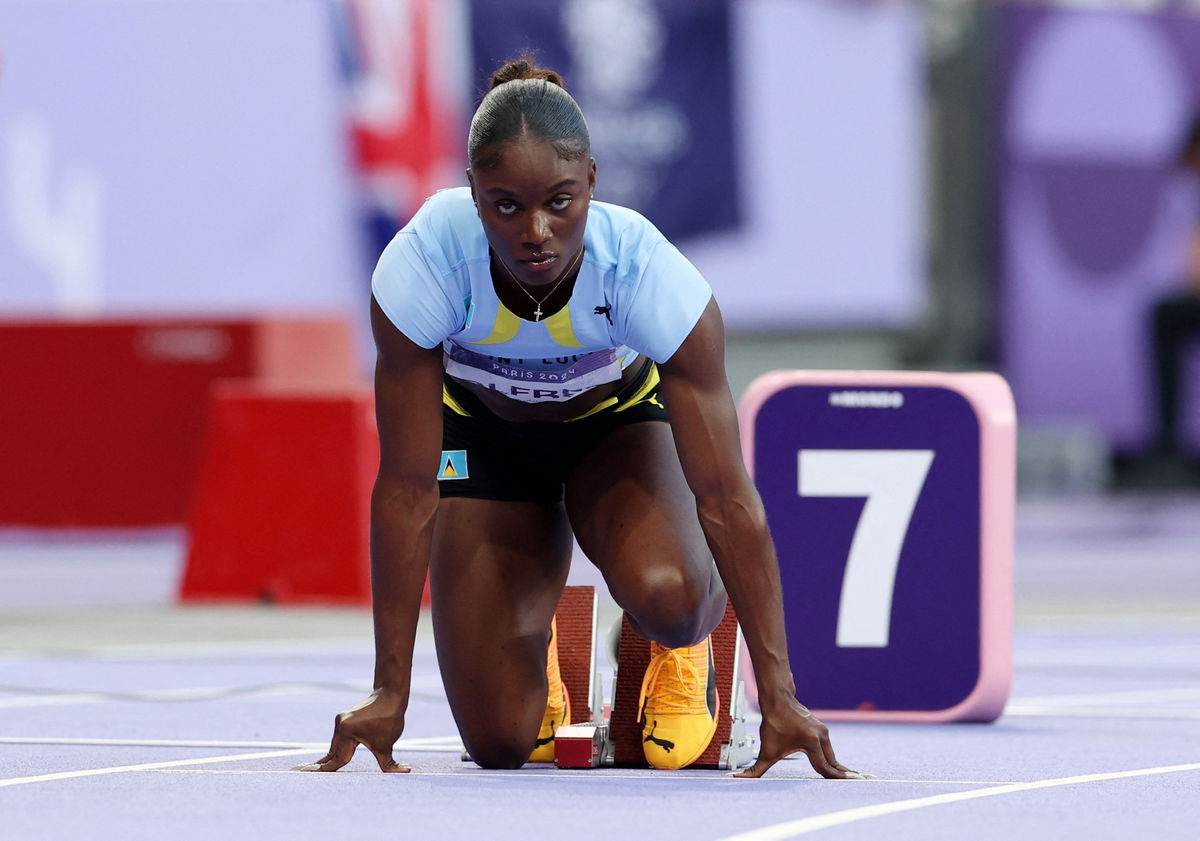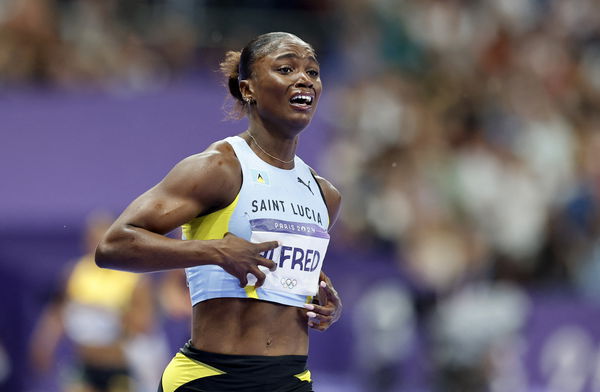
Reuters
Paris 2024 Olympics – Athletics – Women’s 200m Semi-Final 1 – Stade de France, Saint-Denis, France – August 05, 2024. Julien Alfred of Saint Lucia prepares to race. REUTERS/Lisa Leutner

Reuters
Paris 2024 Olympics – Athletics – Women’s 200m Semi-Final 1 – Stade de France, Saint-Denis, France – August 05, 2024. Julien Alfred of Saint Lucia prepares to race. REUTERS/Lisa Leutner
Fresh from her triumph in Paris, Julien Alfred assembled a powerful sequence of races in June and July, winning four of five appearances and setting a personal best in the 200 meters at the London Athletics Meet. Her 21.71 seconds there was not only a career best but also a new meeting record, underscoring her ascent to the very top of global sprinting. Yet, just as the conversation around her dominance was building, confusion and uncertainty began to shape the narrative of her year.
Watch What’s Trending Now!
But before taking those steps back, let us share the good news first. The official Instagram account of the Zurich Diamond League (@weltklassezurich) shared the update of Julien Alfred to be back in the Zurich Diamond League final. The post reading, “Ladies and gentleman, olympic champion Julien Alfred! 🌟 August 28 | Letzigrund Stadium, 20:02 CET,” captured the zeal the entire community must be feeling, especially after all that happened in mid-August.
Organizers and media outlets reported that Alfred had suffered an injury, claiming she would miss three important stops in Silesia, Lausanne, and Brussels. Headlines declared the absence of the 100-meter Olympic champion, and the prevailing storyline painted a portrait of physical setback weeks before the season’s decisive events. Yet, her performances remained among the finest of 2025: A 10.75-second run in Stockholm ranks second in the world this year behind Melissa Jefferson-Wooden, and her consistency across varying conditions from Oslo to Monaco had already secured her ticket to the Zurich final. It was here that the central issue emerged.
ADVERTISEMENT
View this post on Instagram
Alfred later told the St. Lucia Times that she was neither injured nor sidelined. She described the reports as “fake news,” explaining that she was “fine and healthy” but deliberately stepping away to focus on preparation for Zurich and the World Championships in Tokyo. In her words, she was “working on things in preparation for the last few races.”
The revelation placed scrutiny on the reliability of the Diamond League’s communications and highlighted how swiftly misinformation can alter the perception of an athlete’s trajectory. For Alfred, the damage was not physical but reputational, with her name tied unnecessarily to fragility rather than discipline.
ADVERTISEMENT
This was not the first time that her relationship with the Diamond League has been unsettled.
Earlier in her career, she struggled to balance commitments across the circuit, and her training load often clashed with scheduling demands. Now, as the reigning Olympic 100-meter champion, the stakes are higher.
ADVERTISEMENT
Top Stories
Patrick Mahomes’ Dad Faces 10-Year Prison Sentence After Chiefs QB’s Father Reportedly Violated Probation Terms

Prayers Pour In From Jordan Love & Co. as Cowboys Star Mourns Tragic Personal Loss

Justin Jefferson Makes Final Decision on Joining Buffalo Bills After Further Damaging J.J. McCarthy Relationship

Matthew Stafford Makes Final Decision on Retirement After Narrowly Beating Drake Maye For NFL MVP

Multiple PGA Tour Pros Stopped from Playing as WM Phoenix Open Round Is Canceled Over Recurring Problem

PGA Tour Split Into Two as Scottie Scheffler Confirms Stance on Patrick Reed’s Return

By stepping away from Silesia and Lausanne voluntarily, she may have sacrificed anticipated matchups with Jefferson-Wooden and Sha’Carri Richardson, but she protected her long-term goals. The Zurich final at the end of August, followed by the World Championships in Tokyo, will demand her absolute sharpness, and she appears determined to manage her own timeline regardless of outside speculation.
The Zurich organizers have confirmed that Alfred will line up in the 100 meters. This return sets the stage for a direct test of her resilience after a month of conflicting narratives. The broader lesson is as important as the race itself.
In a sport often defined by fractions of a second, clarity of communication can be as crucial as performance on the track. The Diamond League has acknowledged its earlier missteps, and the shift in tone around Alfred suggests that the circuit is eager to restore credibility. Whether she wins in Zurich or not, Julien Alfred has already asserted control over her story—by running fast when it mattered, and by challenging the misinformation that briefly threatened to derail her season.
ADVERTISEMENT
While now Julien Alfred is ruling the tracks as the reigning Olympic champ, her journey to the podium was not a cake walk. Alfred reflected on how poverty, loss, and sacrifice shaped her path to Olympic 100m gold.
Julien Alfred turns poverty and sacrifice into Olympic 100m glory
Julien Alfred speaks of victory in Paris with the candor of someone who understands the cost of ambition. Her journey to the Olympic 100 meters title did not unfold in comfort but was shaped by deprivation, solitude, and an early confrontation with grief.
ADVERTISEMENT
“The sacrifice to leave my family at a tender age, the age of 14, to just chase my dreams, it was definitely a tough decision for me,” she recalled, underscoring the distance she accepted to pursue a career that once seemed far beyond her island’s reach.

Reuters
Paris 2024 Olympics – Athletics – Women’s 100m Final – Stade de France, Saint-Denis, France – August 03, 2024. Julien Alfred of Saint Lucia celebrates after winning gold in the final REUTERS/Stefan Wermuth
Her words are never far from the memory of hardship.
ADVERTISEMENT
“Some days, my mother struggled to find something for us to eat. But I never gave up. I kept pushing,” she reflected. Childhood in Saint Lucia meant running without proper shoes and watching her mother stretch scant resources to feed the family. Later, the death of her father brought such a sharp interruption that she temporarily left the sport altogether. These moments, however, built the resilience that allowed her to endure the long years of training abroad, where she was compelled to live apart from the familiarity of home and the presence of her closest relations.
Now, with an Olympic gold medal resting in her nation’s history, Alfred speaks of a balance between anguish and satisfaction.
“There have been so many things that I can’t pick one but I think all those challenges that I’ve been through have prepared me for what’s to come in my life,” she explained. For Alfred, triumph is not only the title of the world’s fastest woman but the affirmation that perseverance, forged in poverty and sharpened by personal loss, can yield the most extraordinary of outcomes.
ADVERTISEMENT
ADVERTISEMENT
ADVERTISEMENT
ADVERTISEMENT